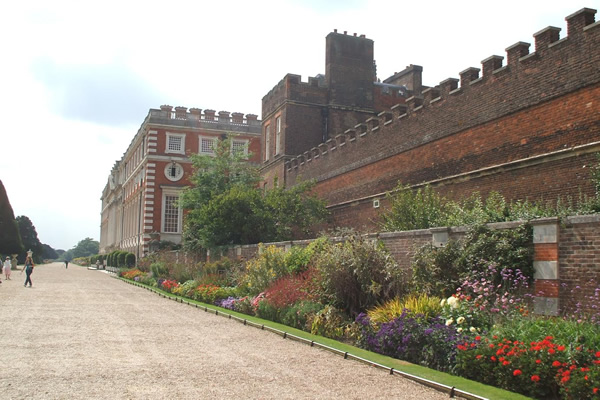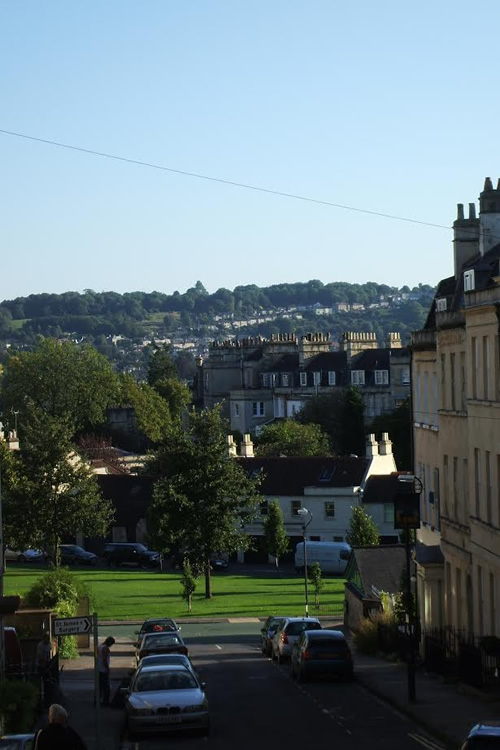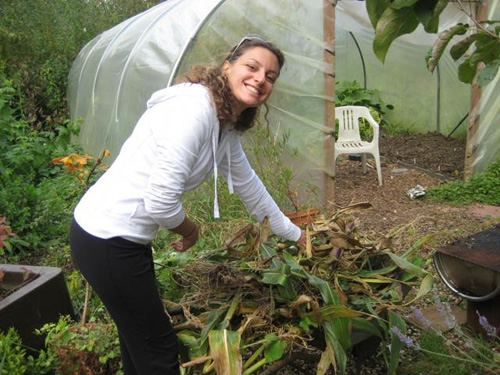Advanced Studies in Bath, England
Overcoming Expectations and Living Life Across the Pond
Article and photos by Regina Toto

|
|
Outing to Hampton Court Palace, former home of King Henry VIII.
|
Preparation and Initiation for Study in Bath
If anyone had told me that one day I would spend four months in Bath, England, I would have been sincerely surprised. As a pre-Medical student, studying abroad was more of a distant fantasy than an attainable reality; I imagined that my many science requirements and entire application process would be major obstacles to traveling overseas. Additionally, I had already been to England once, and while I enjoyed it very much, it just did not seem to be an exotic land – especially when compared to the stories of Africa and India shared by fellow students. Thankfully, however, I made the decision in my late freshman year to remain pre-Med but to major in my longtime love: English. I completed my science requirements and applied to an early acceptance program for medical school, thus opening up my junior year for study abroad. When it came time for me to choose a program, Advanced Studies in England stood out as a perfect fit for my goals of cultural immersion, trips around the United Kingdom provided by the program, and strong academics. I decided to put aside my desire to be different and to follow what my gut told me was right. In August of 2007 I boarded a plane from Philadelphia to London Gatwick, nervous but simultaneously thrilled to begin my adventures abroad.
I arrived in the Georgian city of Bath, just a little over an hour from London, expecting to hate the notorious rainy weather but finding fall full of sunshine and pleasant breezes. I quickly discovered, with the help of my program directors, several things about Bath that surprised me. The grocery stores, which from the outside looked a lot like mine at home, were filled with food I had never heard of. The city itself, with its winding streets and hidden nooks and crannies, was amazingly pedestrian-friendly. And, although the stately homes, pristine flower gardens, and quaint pubs would tempt you to think otherwise, Bath actually had a substantial homeless population. I thus began my British semester with an awakened sense of curiosity and the feeling that much awaited discovery, should I take the initiative and dig deeper.
The Rich and Diverse Academic Experience at ASE
The challenging academic environment of ASE provided me with the opportunity to be taught by British professors while drawing on the surrounding country as an extended classroom. Advanced Studies in England offers humanities courses in a variety of disciplines, from Architecture to Education to Women’s Studies. While in Bath, I was able to fulfill my English major requirements by taking four English literature courses, all together spanning from the fifteenth century to the present day. Each class met once a week and effectively combined lecture, group discussion, and individual presentations. Professors — all British and many from Oxford University−were eager to not only share their expertise in an academic field, but also to discuss British and American cultural differences and to advise us about local things to see and do.
One major component of the academic experience of ASE is a week spent studying in residence at University College, Oxford. For one week, the entire group of students and professors relocates to Oxford University: classes are held in Oxford buildings, and students move into Oxford dormitories and have the chance to explore this lively and diverse city. One afternoon is spent “punting on the Cam,” the time-honored Oxford tradition of using a long pole to propel a boat down the river. The rest of the week’s free time is left open for students to roam as they wish: exploring the other 39 Oxford colleges, having a pint at The Bear (Oxford’s oldest pub), or enjoying a theater production, to name a few options. Finally, the week culminates in a semi-formal dinner at St. Edmund’s College.
My favorite part of the academic experience of ASE was the incorporation of study trips into the curriculum. Each class is allotted one trip to a relevant location, and in most cases, the professors themselves serve as tour guides for the day. My Irish Literature class, for example, spent a weekend in Dublin exploring the old haunts of Oscar Wilde and James Joyce. We also visited the Book of Kells and were shown around Trinity College by my professor−who happened to be an alumnus. Trips for other courses centered on events or festivals rather than places; for example, my contemporary British literature course (The Beast, Big Brother, and Beyond) headed to the Cheltenham Festival of Literature and witnessed live readings by some of the authors whose works we had read for class. Through such trips and tours, ASE allowed us a taste of the thriving intellectual culture of modern England.
Community Involvement
Spending a semester abroad forced me to give up my regular extracurricular activities, but also presented some unique options to spend time learning about British culture and contributing to the local community. Rather than remaining isolated in a university dormitory, my housemates and I lived in a 3-story Georgian home in a residential neighborhood in northern Bath. I loved this arrangement because it allowed for first-hand insight into the day-to-day lives of my British neighbors: every day I saw kids walking to the nursery school down the street, older couples gardening in their yards, and men and women beginning their morning commute. The program staff encouraged us to join in our new community through a variety of activities, from babysitting to dog walking to joining a local sports team. While participation in an activity was not obligatory, ASE offered a Certificate of Cultural Enrichment to students who did so, kept a journal documenting their experiences, and then attended a final discussion about the value of such experiences. Deciding to take part in the CCE program motivated me to get out of the house and spend more time with the British.

|
|
Regina lived on Northampton Street in Bath.
|
Two volunteer activities particularly appealed to me: organic gardening, and serving food at Julian House. I discovered the opportunity to join the organic gardening group by visiting a volunteer placement office in the city center. Gardening, I quickly learned, is a favorite British pastime; in fact, in addition to backyard gardens, many British families also rent allotments of land as additional growing space. One morning per week, I watered, trimmed, weeded, and picked vegetable plants and fruit trees at a large public allotment along with a motley group of Bath’s merriest gardeners. I learned how to recognize ripe broad beans, enjoyed the ever-fleeting but surprisingly sunny fall days, and conversed with several interesting people of all different ages, including a retired school principal, a local farmer, and a certified herbologist. We shared our assumptions about each other’s respective countries and asked questions, candidly discussing the many differences between the U.S. and Britain. The practice of gardening, as well as such conversations, revealed the relaxed pace of British life compared to American life. During our time at the allotment, no one glanced at a watch or even spoke of their commitments later that day, but everyone hesitated to pluck an apple, saying that perhaps it needed just a few more days to ripen.
Serving dinner at Julian House proved to be entirely different than gardening, but still an equally rewarding experience. Once a week, two of my housemates and I walked down to the city center and took over the Julian House kitchen. We prepared hearty stews along with rice or potatoes for the men and women who would be staying the night. Bath is a fairly affluent and aesthetically polished city; nevertheless, like any town its size, it has a substantial population of homeless people. As these people came up to the kitchen to receive their food from me, I grew to know their faces and recognize them around town on street corners, playing music in the square, and walking into pubs. They were people from all walks of life: educated and not, young and old, women and men. After hearing our accents, they inevitably asked where we were from and shared what they knew of America (New York City, football, and Philly cheesesteaks topped the list). Not all demonstrated gratitude for the food we cooked, and the stories we heard were not always happy; nevertheless, our interactions with them made the experience rich and memorable.

|
|
Regina gardening in Bath.
|
Making Every Second (and Dollar) Count in England
One of the most entertaining aspects about studying abroad was making myself at home in another country. I walked absolutely everywhere I needed to go, and some places I simply wanted to go. On foot, I could go where cars could not. I found the short cuts, the side streets and alleys, the cafes and bookstores tucked away where I imagined no one ever found them. Most of all, walking endowed me with a sense of ease on Bath’s streets. By the third week, I felt like a resident of the city.
While I learned how to construct myself a home in a foreign land, I also adopted a new lifestyle based on satisfying my curiosity and exploring outside my window. Since I had no classes on Fridays, I always spent that day traveling, either taking a day trip within England or flying somewhere in Europe. Similarly, since 2007, ASE has incorporated weekly study trips throughout Britain (taking place every Wednesday). It is easy to forget that your country of residence while abroad has just as much to see as any country you will hop a plane to visit. Day trips are especially convenient and inexpensive in England since rail travel is reliable, easy, and cheap. Armed with a journal and a camera, there is nothing to lose but precious time.
Despite the high cost of living in Britain, finding bargains and stretching my dollar was relatively easy. During the time I lived in England, the pound was the strongest it had been in years: 2.2 to one against the dollar. I had checked the exchange rate just before I left, and so I knew what I was going up against. To prepare, I purchased an International Student Identity Card (ISIC) online while still at home. This card, which costs around $20, entitled me to discounts at numerous attractions both in Britain and the rest of Europe. I can honestly say that it paid for itself. Another key money-saver, which I purchased with the help of my ISIC, was a young-person’s rail card to be used in England. This card allowed me to purchase train fares at a discounted rate and proved instrumental for day trips as well as trips to and from the airport. Besides travel and tourist activities, food accounted for much of my expenses. The ASE program fee includes a meal stipend of 60 pounds biweekly, a fairly generous sum if you do not plan to eat out more than one or two nights per week. My housemates and I pooled our meal allowances and shopped for groceries together; one person cooked per night, and so with seven people, we were covered for the week. Grocery shopping at stores with mid- and low-range prices kept our spending in check. We also enjoyed getting to know British food and learning how to cook together.
Concluding Remarks
Studying abroad in Bath proved to be a critical part of my undergraduate education. I learned that even amidst my science-filled pre-Medical curriculum, I could still major in English and arrange my course schedule to accommodate a semester abroad. Although I initially assumed England would be similar to the U.S. and that other lands would prove far more exciting, I soon realized that such assumptions are completely wrong: for four months, I immersed myself in an entirely different culture and felt excitement at every turn. Over a year later, I look back at my semester in Bath as an irreplaceable time of both academic and personal growth.
Advice for Students Thinking About Studying Abroad
-
Just do it!
-
Take the planning seriously. First, narrow down your choices by geographic location, and then assess programs based on the following criteria: academics, living arrangements (does it offer a home stay?), what is included (study trips? meal plan?), and expenses (flight, cost of traveling while there, etc.).
-
Talk to previous participants in your prospective program. If you do not already know someone who has participated, then contact the program administrators and ask for the contact information of a past student. They usually will be happy to give you a contact; if they are not, then proceed with caution.
-
Get involved right away! Once you arrive, try to find ways you can get involved in the local community. Activities allow you to meet natives of the country you are in, and as an added bonus, they also combat homesickness!
-
Travel. Use your spare time to travel around the country, or to visit other countries. Wherever you go, bring a camera and a journal and use them!
-
Enjoy yourself. Cherish this experience and make the most of every minute.
For More Info
ASE Information:
www.studyabroadbath.org
ISIC Discount Card
BritRail, for information about discount railcards:
www.britrail.com
|
Regina Toto grew up in Drexel Hill, Pennsylvania, and enjoys reading and traveling in her free time. She is a senior at Franklin & Marshall College in Lancaster, PA. Regina graduated in 2009 with a degree in English Literature and a minor in Medicine in Society. She then started her studies at the George Washington University School of Medicine in the fall, which she completed in 2013 before starting her career as a Physician in Pediatrics.
|
